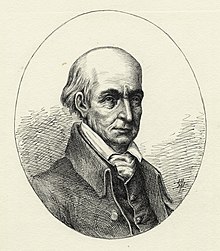George Thatcher
| George Thatcher | |
|---|---|
 |
|
| Member of the U.S. House of Representatives from Massachusetts's 14th district |
|
|
In office March 4, 1795 – March 3, 1801 |
|
| Preceded by | District created |
| Succeeded by | Richard Cutts |
| Member of the U.S. House of Representatives from Massachusetts's 4th district |
|
|
In office March 4, 1793 – March 3, 1795 Serving with Henry Dearborn and Peleg Wadsworth (General ticket) |
|
| Preceded by | Theodore Sedgwick |
| Succeeded by | Dwight Foster |
| Member of the U.S. House of Representatives from Massachusetts's 8th district |
|
|
In office March 4, 1791 – March 3, 1793 |
|
| Preceded by | Jonathan Grout |
| Succeeded by | District eliminated until 1795 |
| Member of the U.S. House of Representatives from Massachusetts's 6th district |
|
|
In office March 4, 1789 – March 3, 1791 |
|
| Preceded by | District created |
| Succeeded by | George Leonard |
| Personal details | |
| Born |
April 12, 1754 Yarmouth, Massachusetts |
| Died | April 6, 1824 (aged 69) Biddeford, Maine |
| Political party | Federalist |
| Alma mater | Harvard College |
| Occupation | Lawyer |
| Religion | Unitarian |
George Thatcher (April 12, 1754 – April 6, 1824) was an American lawyer, jurist, and statesman from the Maine district of Massachusetts. His name sometimes appears as George Thacher. He was a delegate for Massachusetts to the Continental Congress in 1787 and 1788. He was an associate justice of the Massachusetts Supreme Judicial Court from 1801 to 1824.
Thatcher was born April 12, 1754, in Yarmouth, Province of Massachusetts Bay. After private tutoring, he attended Harvard, graduating in 1776. He read law and was admitted to the bar in 1778, and then moved to York to open a practice. By 1782 he had settled in Biddeford.
Thatcher was named as one of the Massachusetts delegates to the Continental Congress in 1787. He wrote under the name "Scribble Scrabble."
He was later elected a U.S. Congressman from the Maine district of Massachusetts, as a Pro-administration candidate in 1789 to 1792 and as a Federalist from 1794 to 1801.
In 1788 North Carolina passed a law allowing the capture and sale of any former slave who had been freed without court approval. Many freed African Americans fled the state to avoid being captured and sold back into slavery. Rev Absalom Jones drafted a petition on behalf of four freed slaves, the first group of African Americans to petition the U.S. Congress. The petition related to the 1793 Fugitive Slave Act and asked Congress to adopt “some remedy for an evil of such magnitude.”
The petition was presented on 30 January 1797 by U.S. Representative John Swanwick of Pennsylvania. Although Representative Thatcher argued that the petition should be accepted and referred to the Committee on the Fugitive Law, the House of Representatives declined to accept the petition by a vote of was 50 to 33.
...
Wikipedia
